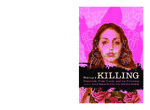Please use this identifier to cite or link to this item:
http://lib.hpu.edu.vn/handle/123456789/30014Full metadata record
| DC Field | Value | Language |
|---|---|---|
| dc.contributor.author | Alba, Alicia Gaspar De | en_US |
| dc.contributor.author | Guzmán, Georgina | en_US |
| dc.date.accessioned | 2018-03-27T03:35:25Z | |
| dc.date.available | 2018-03-27T03:35:25Z | |
| dc.date.issued | 2010 | en_US |
| dc.identifier.isbn | 029272277X | en_US |
| dc.identifier.isbn | 9780292722774 | en_US |
| dc.identifier.isbn | 0292723172 | en_US |
| dc.identifier.isbn | 9780292723177 | en_US |
| dc.identifier.other | HPU4162179 | en_US |
| dc.identifier.uri | https://lib.hpu.edu.vn/handle/123456789/30014 | - |
| dc.description.abstract | Since 1993, more than five hundred women and girls have been murdered in Ciudad Ju?rez across the border from El Paso, Texas. At least a third have been sexually violated and mutilated as well. Thousands more have been reported missing and remain unaccounted for. The crimes have been poorly investigated and have gone unpunished and unresolved by Mexican authorities, thus creating an epidemic of misogynist violence on an increasingly globalized U.S.-Mexico border.This book, the first anthology to focus exclusively on the Ju?rez femicides, as the crimes have come to be known, compiles several different scholarly "interventions" from diverse perspectives, including feminism, Marxism, critical race theory, semiotics, and textual analysis. Editor Alicia Gaspar de Alba shapes a multidisciplinary analytical framework for considering the interconnections between gender, violence, and the U.S.-Mexico border. The essays examine the social and cultural conditions that have led to the heinous victimization of women on the border--from globalization, free trade agreements, exploitative maquiladora working conditions, and border politics, to the sexist attitudes that pervade the social discourse about the victims. The book also explores the evolving social movement that has been created by NGOs, mothers' organizing efforts, and other grassroots forms of activism related to the crimes. Contributors include U.S. and Mexican scholars and activists, as well as personal testimonies of two mothers of femicide victims. | en_US |
| dc.format.extent | 329 p. | en_US |
| dc.format.mimetype | application/pdf | en_US |
| dc.language.iso | en | en_US |
| dc.publisher | Humana Press | en_US |
| dc.subject | Femicide | en_US |
| dc.subject | Free Trade | en_US |
| dc.subject | Killing | en_US |
| dc.title | Making a Killing: Femicide, Free Trade, and La Frontera (Chicana Matters) | en_US |
| dc.type | Book | en_US |
| dc.size | 4.53 MB | en_US |
| dc.department | Technology | en_US |
| Appears in Collections: | Technology | |
Files in This Item:
| File | Description | Size | Format | |
|---|---|---|---|---|
| Making-a-Killing-Femicide-Free-Trade-and-La-Frontera-Chicana-Matters-2150.pdf Restricted Access | 4.64 MB | Adobe PDF |  View/Open Request a copy |
Items in DSpace are protected by copyright, with all rights reserved, unless otherwise indicated.
